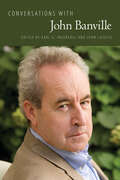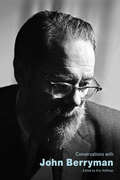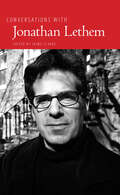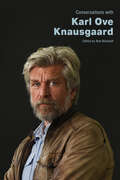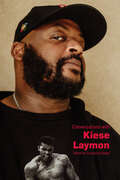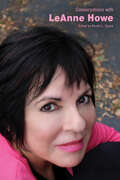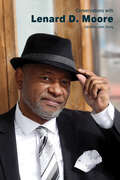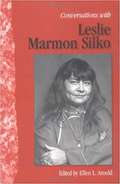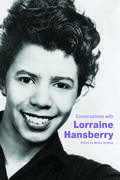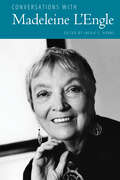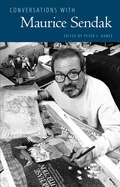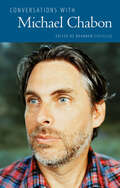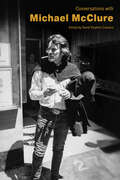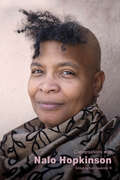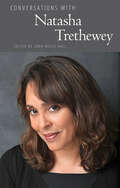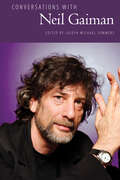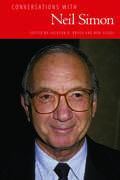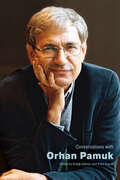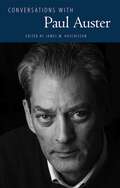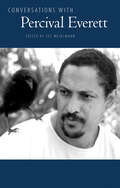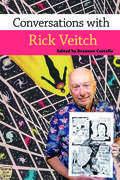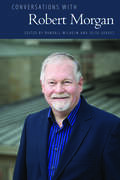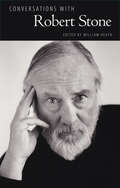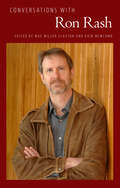- Table View
- List View
Conversations with John Banville (Literary Conversations Series)
by Earl G. Ingersoll and John CusatisJohn Banville (b. 1945) is a distinguished novelist and winner of several prestigious awards, including the Man Booker Prize for his novel The Sea. As a teenager Banville hoped to be a painter, and although he ultimately decided he lacked the talent for it, his passion for painting continues to influence and inform his work. Banville conceives the novel as a work of art aimed not at the present, but for the ages. He aspires to create narratives that offer readers a sense of what it is to be conscious, human, and feeling, and aims to convey his conviction that “the familiar is always unfamiliar, the ordinary extraordinary.” Conversations with John Banville is the first interview collection with this esteemed writer and includes eighteen interviews that reflect on nearly five decades of work, from his first book, Long Lankin, to his novel Mrs. Osmond and memoir, Time Pieces. The collection also includes discussions about—and with, in the case of James Gleick’s 2014 interview—Banville’s alter ego, Benjamin Black, who writes crime novels. Highly engaging and insightful, Banville’s interviews offer a variety of writerly autobiography regarding what he has aimed to do in his work and how he continues to pursue perfection, which he has known from the beginning must be impossible.
Conversations with John Berryman (Literary Conversations Series)
by Eric HoffmanThe poetry of John Berryman (1914–1972) is primarily concerned with the self in response to the rapid social, political, sexual, racial, and technological transformations of the twentieth century, and their impact on the psyche and spirit, both individual and collective. He was just as likely to find inspiration in his local newspaper as he was from the poetry of Hopkins or Milton. In fact, in contrast to the popular perception of Berryman drunkenly composing strange, dreamlike, abstract, esoteric poems, Berryman was intensely aware of craft. His best work routinely utilizes a variety of rhetorical styles, shifting effortlessly from the lyric to the prosaic. For Berryman, poetry was nothing less than a vocation, a mission, and a way of life. Though he desired fame, he acknowledged its relative unimportance when he stated that the “important thing is that your work is something no one else can do.” As a result, Berryman very rarely granted interviews—“I teach and I write,” he explained, “I’m not copy”—yet when he did the results were always captivating. Collected in Conversations with John Berryman are all of Berryman’s major interviews, personality pieces, profiles, and local interest items, where interviewers attempt to unravel him, as both Berryman and his interlocutors struggle to find value in poetry in a fallen world.
Conversations with Jonathan Lethem (Literary Conversations Series)
by Jaime ClarkeConversations with Jonathan Lethem collects fourteen interviews, conducted over a decade and a half, with the Brooklyn-born author of such novels as Girl in Landscape, Motherless Brooklyn, The Fortress of Solitude, Chronic City, and many others. Winner of the National Book Critics' Circle Award, Lethem (b. 1964) covers a wide range of subjects, from what it means to incorporate genre into literature, to the impact of the death of his mother on his life and work, to his being a permanent "sophomore on leave" from Bennington College, as well as his flight from Brooklyn to California and its lasting effect on his fiction. Lethem also reveals the many literary and pop culture influences that have informed his writing life. Readers will find Lethem as charming and generous and intelligent as his work. His examination of what it means to live a creative life will reverberate and enlighten scholars and fans alike. His thoughts on science fiction, intellectual property, literary realism, genre, movies, and rock 'n' roll are articulated with elán throughout the collection, as are his comments on his own development as a craftsman.
Conversations with Karl Ove Knausgaard (Literary Conversations Series)
by Bob BlaisdellNorwegian author Karl Ove Knausgaard (b. 1968) made a literary mark on his home country in 1998, when his debut novel won the prestigious Norwegian Critics Prize for Literature. His fame continued to grow with the publication of his six-volume autobiographical series Min Kamp, or My Struggle. Translated into English in 2012, the critically acclaimed and controversial series garnered global attention, as did its author. Conversations with Karl Ove Knausgaard is a collection of twenty-two interviews, each conducted during the ten-year span in which Knausgaard’s literary prowess gained worldwide recognition.Knausgaard is both a daring writer and a daring interviewee. He grounds his observations in the ordinary aspects of the world around him, which, he insists, is the same world in front of most of his readers. He regards his appearances in newspapers, magazines, and literary festivals as “a performance,” where he plays himself. While that role may differ from his inner life, it is consistent with the role he plays in his autobiographical novels. Fans of Knausgaard will easily recognize this public persona, an embodiment of the protagonist, husband, and father featured in My Struggle and in the Seasons quartet.Knausgaard discusses his work, aspects of his personal life, and his writing routines and practices in marvelous detail. He comments on literary and artistic world classics and on international contemporary authors. A bilingual speaker, he is accustomed to appearing before the press and in front of audiences in his roles as a famous author and as the publisher and cofounder of the publishing house Pelikanen (Pelican). Remarkable for his candor and directness, Knausgaard delivers the same variety and number of surprises in these interviews as he does in his most thrilling books.
Conversations with Kiese Laymon (Literary Conversations Series)
by Constance BaileyIn over a dozen interviews, Conversations with Kiese Laymon provides an in-depth look at author Kiese Laymon as an educator, creative writer, activist, family member, and Mississippian. Interviews capture surprising insights into Laymon’s life and craft. Within these pages, Laymon talks about his engagement with other writers, including Richard Wright, William Faulkner, and Eudora Welty. These revelations situate his memoir, Heavy, among other great Mississippi autobiographies and memoirs, such as Anne Moody’s Coming of Age in Mississippi, Welty’s One Writer’s Beginnings, Jesmyn Ward’s Men We Reaped, and Natasha Trethewey’s Memorial Drive. In other interviews, he discusses his obsession with revision and deftly fields questions about pop culture, politics, and Black masculinity, along with a host of other pressing contemporary issues. As the first collection of its kind, Conversations with Kiese Laymon serves as the perfect introduction to studying Laymon. The cross section of interviews included reflects Laymon’s humility, while simultaneously celebrating his accomplishments. Most importantly, the interviews reflect his stature as a major American literary figure. With topics ranging from hip-hop and family to politics and everything in between, this volume provides an unfiltered look at the prolific Southern writer in his own words.
Conversations with LeAnne Howe (Literary Conversations Series)
by Kirstin L. SquintConversations with LeAnne Howe is the first collection of interviews with the groundbreaking Choctaw author, whose genre-bending works take place in the US Southeast, Oklahoma, and beyond our national borders to bring Native American characters and themes to the global stage. Best known for her American Book Award–winning novel Shell Shaker (2001), LeAnne Howe (b. 1951) is also a poet, playwright, screenwriter, essayist, theorist, and humorist. She has held numerous honors including a Fulbright Distinguished Scholarship in Amman, Jordan, from 2010 to 2011, and she was the recipient of the Modern Language Association’s first Prize for Studies in Native American Literatures, Cultures, and Languages for her travelogue, Choctalking on Other Realities (2013).Spanning the period from 2002 to 2020, the interviews in this collection delve deeply into Howe’s poetics, her innovative critical methodology of tribalography, her personal history, and her position on subjects ranging from the Lone Ranger to Native American mascots. Two previously unpublished interviews, “‘An American in New York’: LeAnne Howe” (2019) and “Genre-Sliding on Stage with LeAnne Howe” (2020), explore unexamined areas of her personal history and how it impacted her creative work, including childhood trauma and her incubation as a playwright in the 1980s. These conversations along with 2019’s Occult Poetry Radio interview also give important insights on the background of Howe’s newest critically acclaimed work, Savage Conversations (2019), about Mary Todd Lincoln’s hallucination of a “Savage Indian” during her time in Bellevue Place sanitarium. Taken as a whole, Conversations with LeAnne Howe showcases the development and continued impact of one of the most important Indigenous American writers of the twenty-first century.
Conversations with Lenard D. Moore (Literary Conversations Series)
by John ZhengKnown internationally for his Japanese-style poetry, Lenard D. Moore (b. 1958) has published eight poetry collections over the course of his career. Moore has distinguished himself especially in such forms as jazz poetry, haiku, tanka, renga, sequence, and haibun, expressing moments of aesthetic delight as well as a voice enriched with African American culture. Conversations with Lenard D. Moore is a fundamental collection of sixteen interviews with the esteemed writer and former president of the Haiku Society of America.To Moore, jazz is a joyful celebration of American life and culture. The impacts of such great jazz musicians as Max Roach, John Coltrane, Thelonious Monk, Duke Ellington, and Ray Charles are clear in his poetry. The conversations collected here lead the reader into Moore’s creative mind, demonstrating his fusion of African American music, culture, and history into poetry, especially his jazz poetry, jazzku, and bluesku. In interviews that range from 1995 to 2023, Moore reveals his capabilities and responsibilities as a contemporary poet, professor, mentor, editor, and organizer. This volume serves as an indispensable source for writers and readers of poetry and African American literature.
Conversations with Leslie Marmon Silko
by Ellen L. ArnoldThe conversations included here reveal how Silko's thought and writing have been influenced by American and British literature, Eastern philosophies, economics, politics, psychology, and physics. As she integrates these into her powerful works and her expansive interviews, she expresses a hopeful vision of global spiritual awakening.
Conversations with Lorraine Hansberry (Literary Conversations Series)
by Mollie GodfreyHonorable Mention Recipient of the Modern Language Association Prize for Collaborative, Bibliographical, or Archival ScholarshipSpanning from the debut of A Raisin in the Sun on Broadway in 1959 to her early death from cancer in January 1965, Lorraine Hansberry’s short stint in the public eye changed the landscape of American theater. With A Raisin in the Sun, Hansberry (1930–1965) became both the first African American woman to have a play produced on Broadway and the first to win the prestigious New York Drama Critics’ Circle Award. Resonating deeply with the aims of the civil rights movement, Raisin also ushered in a new era of Black representation on the stage and screen, displacing the cartoonish stereotypes that were the remnants of blackface minstrelsy in favor of complex three-dimensional portrayals of Black characters and Black life. Hansberry’s public discourse in the aftermath of Raisin’s success also disrupted mainstream critical tendencies to diminish the work of Black artists, helping pave the way for future work by Black playwrights. Conversations with Lorraine Hansberry is the first volume to collect all of her substantive interviews in one place, including many radio and television interviews that have never before appeared in print. The twenty-one pieces collected here—ranging from just before the Broadway premiere of A Raisin in the Sun to less than six months before Hansberry’s death—offer an incredible window into Hansberry’s aesthetic and political thought. In these conversations, Hansberry explores many of the questions most often put to Black writers of the mid-twentieth century—including everything from her thinking about the relationship between art and protest, universality and particularity, and realism and naturalism, to her sense of the relationship between Black intellectuals and the Black masses, integration and Black Nationalism, and African American and Pan-African liberation. Taken together, these interviews reveal the insight, intensity, and eloquence that made Hansberry such a transformative figure in American letters.
Conversations with Madeleine L'Engle (Literary Conversations Series)
by Jackie C. HorneConversations with Madeleine L’Engle is the first collection of interviews with the beloved children’s book author best known for her 1962 Newbery Award–winning novel, A Wrinkle in Time. However, Madeleine L’Engle's accomplishments as a writer spread far beyond children’s literature. Beginning her career as a literary novelist for adults, L’Engle (1918–2007) continued to write fiction for both young and old long after A Wrinkle in Time. In her sixties, she published personal memoirs and devotional texts that explored her relationship with religion. At the time of her death, L’Engle was mourned by fans of her children’s books and the larger Christian community.L’Engle’s books, as well as her life, were often marked by contradictions. A consummate storyteller, L’Engle carefully crafted and performed a public self-image via her interviews. Weaving through the documentable facts in these interviews are partial lies, misdirections, and wish-fulfillment fantasies. But, when read against her fictions, these “truths” can help us see L’Engle more deeply—what she wanted for herself and for her children, what she believed about good and evil, and what she thought was the right way and the wrong way to be a family—than if she had been able to articulate the truth more directly.The thirteen interviews collected here reveal an amazing feat of authorial self-fashioning, as L’Engle transformed from novelist to children’s author to Christian writer and attempted to craft a public persona that would speak to each of these different audiences in meaningful, yet not painfully revealing, ways.
Conversations with Maurice Sendak (Literary Conversations Series)
by Peter C. KunzeMaurice Sendak (1928–2012) stands out as one of the most respected, influential authors of the twentieth century. Though primarily known as a children’s book writer and illustrator, he did not limit himself to these areas. He saw himself first and foremost as an artist. In this collection of interviews, Sendak presents himself as a writer, illustrator, set designer, and librettist. From his early work with Randall Jarrell and Ruth Krauss through his later work with Tony Kushner and Spike Jonze, Sendak worked as a collaborator with a passion for the arts.The interviews here, many of which are hard to find or previously unpublished, span from 1966 through 2011. They show not only Sendak’s shifting artistic interests, but also changes in how he understood himself and his craft. What emerges is a portrait of an author and an artist who was alternately solemn and playful, congenial and irascible, sophisticated and populist. The man who showed millions of children and adults alike what’s cooking in the night kitchen and where the wild things are, Sendak remains an American original who redefined the picture book and changed children’s literature—and its readers—forever.
Conversations with Michael Chabon (Literary Conversations Series)
by Brannon CostelloSince the publication of his first novel, The Mysteries of Pittsburgh, launched him to fame, Michael Chabon (b. 1963) has become one of contemporary literature's most acclaimed novelists by pursuing his singular vision across all boundaries of genre and medium. A firm believer that reading even the most challenging literature should be a fundamentally pleasurable experience, Chabon has produced an astonishingly diverse body of work that includes detective novels, weird tales of horror, alternate history science fiction, and rollicking chronicles of swashbuckling adventure alongside tender coming-of-age stories, sprawling social novels, and narratives of intense introspection. Uniting them all is Chabon's utterly distinct prose style--exuberant and graceful, sometimes ironic but never cynical. His work has earned accolades ranging from the Pulitzer Prize to science fiction's Hugo and Nebula Awards. Conversations with Michael Chabon collects eighteen revealing interviews with the renowned author of The Amazing Adventures of Kavalier & Clay, The Yiddish Policemen's Union, and other much-admired works. Spanning nearly twenty years and drawn from science fiction fan magazines and literary journals alike, these interviews shed new light on the central concerns of Chabon's fiction, including the importance of dismantling the false divide between literary and lowbrow, his evolving relationship to Jewish culture and literature, the unique properties of male friendship, and the complexities of race in contemporary America. These interviews are essential reading for anyone seeking a better understanding of the life and work of an author who has been instrumental in defining the landscape of contemporary American fiction.
Conversations with Michael McClure (Literary Conversations Series)
by David Stephen CalonneConversations with Michael McClure features twenty interviews from 1969 to 2015 that chronicle the capacious scope of McClure’s creativity. McClure (1932–2020) is notable not only for his considerable achievements as a poet and prose writer of the Beat Generation, but also for the many collaborative connections he forged over seven decades. From the 1950s to his death, McClure worked with an astonishing range of important figures in the worlds of painting, filmmaking, music, and science. McClure counted among his friends and acquaintances Bruce Conner, Harold Pinter, Amiri Baraka, Richard Brautigan, Wallace Berman, George Herms, Lawrence Jordan, Dennis Hopper, Bob Dylan, Janis Joplin, Jim Morrison, Ray Manzarek, Sterling Bunnell, Francis Crick, Gary Snyder, Francesco Clemente, and Diane di Prima.During his early years in San Francisco, McClure attended Kenneth Rexroth’s literary evenings and formed significant lifelong friendships. Among those friends were poets Philip Lamantia and Robert Duncan, who became a mentor to McClure. He also learned much from Charles Olson and adopted several features of Olson’s concept of “Projective Verse” in his own work. McClure’s exchange of letters with experimental filmmaker Stan Brakhage lasted for four decades. During his illustrious career, McClure published fourteen books of poetry, eight books of plays, and four collections of essays. Conversations with Michael McClure reveals the many contributions of this central personality in the evolution of the American counterculture.
Conversations with N. Scott Momaday
by Matthias SchubnellA collection of various interviews with Momaday.
Conversations with Nalo Hopkinson (Literary Conversations Series)
by Isiah Lavender IIIA key figure in contemporary speculative fiction, Jamaican-born Canadian Nalo Hopkinson (b. 1960) is the first Black queer woman as well as the youngest person to be named a Grand Master by the Science Fiction and Fantasy Writers of America. Her Caribbean-inspired narratives—Brown Girl in the Ring, Midnight Robber, The Salt Roads, The New Moon’s Arms, The Chaos, and Sister Mine—project complex futures and complex identities for people of color in terms of race, sex, and gender. Hopkinson has always had a vested interest in expanding racial and ethnic diversity in all facets of speculative fiction from its writers to its readers, and this desire is reflected in her award-winning anthologies. Her work best represents the current and ongoing colored wave of science fiction in the twenty-first century.In twenty-one interviews ranging from 1999 until 2021, Conversations with Nalo Hopkinson reveals a writer of fierce intelligence and humor in love with ideas and concerned with issues of identity. She provides powerful insights on code-switching, race, Afrofuturism, queer identities, sexuality, Caribbean folklore, and postcolonial science fictions, among other things. As a result, the conversations presented here very much demonstrate the uniqueness of her mind and her influence as a writer.
Conversations with Natasha Trethewey (Literary Conversations Series)
by Joan Wylie HallUnited States Poet Laureate Natasha Trethewey (b. 1966) describes her mode as elegiac. Although the loss of her murdered mother informs each book, Trethewey's range of forms and subjects is wide. In compact sonnets, elegant villanelles, ballad stanzas, and free verse, she creates monuments to mixed-race children of colonial Mexico, African American soldiers from the Civil War, a beautiful prostitute in 1910 New Orleans, and domestic workers from the twentieth-century North and South. Because her white father and her black mother could not marry legally in Mississippi, Trethewey says she was "given" her subject matter as "the daughter of miscegenation." A sense of psychological exile is evident from her first collection, Domestic Work (2000), to the recent Thrall (2012). Biracial people of the Americas are a major focus of her poetry and her prose book Beyond Katrina, a meditation on family, community, and the natural environment of the Mississippi Gulf Coast. The interviews featured within Conversations with Natasha Trethewey provide intriguing artistic and biographical insights into her work. The Pulitzer Prize-winning poet cites diverse influences, from Anne Frank to Seamus Heaney. She emotionally acknowledges Rita Dove's large impact, and she boldly positions herself in the southern literary tradition of Faulkner and Robert Penn Warren. Commenting on "Pastoral," "South," and other poems, Trethewey guides readers to deeper perception and empathy.
Conversations with Neil Gaiman (Literary Conversations Series)
by Joseph Michael SommersNeil Gaiman (b. 1960) currently reigns in the literary world as one of the most critically decorated and popular authors of the last fifty years. Perhaps best known as the writer of the Harvey, Eisner, and World Fantasy Award-winning DC/Vertigo series, The Sandman, Gaiman quickly became equally renowned in literary circles for works such as Neverwhere, Coraline, and American Gods, as well as the Newbery and Carnegie Medal-winning The Graveyard Book. For adults, for children, for the comics reader to the viewer of the BBC’s Doctor Who, Gaiman’s writing has crossed the borders of virtually all media and every language, making him a celebrity on a worldwide scale. The interviews presented here span the length of his career, beginning with his first formal interview by the BBC at the age of seven and ending with a new, unpublished interview held in 2017. They cover topics as wide and varied as a young Gaiman's thoughts on Scientology and managing anger, learning the comics trade from Alan Moore, and being on the clock virtually 24/7. What emerges is a complicated picture of a man who seems fully assembled from the start of his career, but only came to feel comfortable in his own skin and voice far later in life. The man who brought Morpheus from the folds of his imagination into the world shares his dreams and aspirations from different points in his life, including informing readers where he plans to take them next.
Conversations with Neil Simon (Literary Conversations Series)
by Jackson R. Bryer and Ben SiegelNeil Simon (1927–2018) began as a writer for some of the leading comedians of the day—including Jackie Gleason, Red Buttons, Phil Silvers, and Jerry Lewis—and he wrote for fabled television programs alongside a group of writers that included Mel Brooks, Woody Allen, Larry Gelbart, Michael Stewart, and Sid Caesar. After television, Simon embarked on a playwriting career. In the next four decades he saw twenty-eight of his plays and five musicals produced on Broadway. Thirteen of those plays and three of the musicals ran for more than five hundred performances. He was even more widely known for his screenplays—some twenty-five in all. Yet, despite this success, it was not until his BB Trilogy—Brighton Beach Memoirs, Biloxi Blues, and Broadway Bound—that critics and scholars began to take Simon seriously as a literary figure. This change in perspective culminated in 1991 when his play Lost in Yonkers won the Pulitzer Prize for Drama. In the twenty-two interviews included in Conversations with Neil Simon, Simon talks candidly about what it was like to write commercially successful plays that were dismissed by critics and scholars. He also speaks at length about the differences between writing for television, for the stage, and for film. He speaks openly and often revealingly about his relationships with, among many others, Mike Nichols, Walter Matthau, Sid Caesar, and Jack Lemmon. Above all, these interviews reveal Neil Simon as a writer who thought long and intelligently about creating for stage, film, and television, and about dealing with serious subjects in a comic mode. In so doing, Conversations with Neil Simon compels us to recognize Neil Simon’s genius.
Conversations with Orhan Pamuk (Literary Conversations Series)
by Erdağ Göknar and Pelin KıvrakIn over thirty interviews conducted between 1982 and 2022, Conversations with Orhan Pamuk reveals a writer of intense literary and political engagement.Nobel laureate Orhan Pamuk (b. 1952) is a foremost practitioner of the global novel today. His books have been translated into over sixty languages and sold over fifteen million copies globally. The interviews in this volume open windows onto Pamuk's everyday life, craft, and process, constituting an alternative literary history that provides insights into the novelist's influences, method, form, and content. These conversations reveal that a Pamuk novel is predicated on methodical research, at times archival and scholarly, investigative and journalistic, or ethnographic. They are necessarily instructive and edifying as much as they are entertaining, providing a discursive space of literary history where writing, politics, and the everyday intersect and where the politics of literature can be located.
Conversations with Paul Auster (Literary Conversations Series)
by James M. HutchissonPaul Auster (b. 1947) is one of the most critically acclaimed and intensely studied authors in America today. His varied career as a novelist, poet, translator, and filmmaker has attracted scholarly scrutiny from a variety of critical perspectives. The steadily rising arc of his large readership has made him something of a popular culture figure with many appearances in print interviews, as well as on television, the radio, and the internet. Auster's best-known novel may be his first, City of Glass (1985), a grim and intellectually puzzling mystery that belies its surface image as a “detective novel” and goes on to become a profound meditation on transience and mortality, the inadequacies of language, and isolation. Fifteen more novels have followed since then, including The Music of Chance, Moon Palace, The Book of Illusions, and The Brooklyn Follies. He has, in the words of one critic, “given the phrase ‘experimental fiction’ a good name” by fashioning bona fide literary works with all the rigor and intellect demanded of the contemporary avant-garde. This volume—the first of its kind on Auster—will be useful to both scholars and students for the penetrating self-analysis and the wide range of biographical information and critical commentary it contains. Conversations with Paul Auster covers all of Auster's oeuvre, from The New York Trilogy—of which City of Glass is a component—to Sunset Park (2010), along with his screenplays for Smoke (1995) and Blue in the Face (1996). Within, Auster nimbly discusses his poetry, memoir, nonfiction, translations, and film directing.
Conversations with Percival Everett (Literary Conversations Series)
by Joe WeixlmannFor the first eighteen years of his career, Percival Everett (b. 1956) managed to fly under the radar of the literary establishment. He followed his artistic vision down a variety of unconventional paths, including his preference for releasing his books through independent publishers. But with the publication of his novel erasure in 2001, his literary talent could no longer be kept under wraps. The author of more than twenty-five books, Everett has established himself as one of America's—and arguably the world's—premier twenty-first-century fiction writers. Among his many honors since 2000 are Hurston/Wright Legacy Awards for erasure and I Am Not Sidney Poitier (2009) and three prominent awards for his 2005 novel Wounded—the PEN Center USA Literary Award for Fiction, France's Prix Lucioles des Libraires, and Italy's Premio Vallombrosa Gregor von Rezzori Prize. Interviews collected in this volume—several of which appear in print or in English translation for the first time—display Everett's abundant wit as well as the independence of thought that has led to his work being described as “characteristically uncharacteristic.” At one moment he speaks with great sophistication about the fact that African American authors are forced to overcome constraining expectations about their subject matter that white writers are not. And in the next he talks about training mules or quips about “Jim Crow,” a pet bird Everett had on his ranch outside Los Angeles. Everett discusses race and gender, his ecological interests, the real and mythic American West, the eclectic nature of his work, the craft of writing, language and linguistic theory, and much more.
Conversations with Rick Veitch (Conversations with Comic Artists Series)
by Brannon CostelloFrom his roots in underground comics to his high-profile runs on mainstream characters, Rick Veitch (b. 1951) has carved out a career unlike anyone else’s. Collecting thirteen interviews—including three published here for the first time—Conversations with Rick Veitch offers a wealth of insight not only into the development of Veitch’s graphic innovations and metaphysical explorations, but also into the upheavals and transformations of American comics from the 1970s to today. In acclaimed comics such as The Maximortal, Army@Love, and Can’t Get No, Veitch employs a style that synthesizes Jack Kirby at his most cosmic, the mind-bending graphic sensibility of European innovators such as Jean (Moebius) Giraud and Philippe Druillet, and the brass-tacks realism of classic war cartoonists such as John Severin and Russ Heath. His comics defamiliarize popular genres—especially superheroes, war stories, and science fiction—with his philosophical musings and pointedly satirical political perspective. Yet Veitch’s capacious mind reaches beyond these familiar genres, too, as his long-running autobiographical dream comic Roarin’ Rick’s Rare Bit Fiends attests. Ranging across topics such as his early days at the Joe Kubert School, the controversial end of his Swamp Thing run, his muckraking work as a comics journalist, and his educational comics publishing venture, Eureka Comics, the interviews collected here reveal Veitch to be both a shrewd observer of the pitfalls of the marketplace and an eloquent spokesman for the boundless potential of creativity. A comics maker since childhood and a fierce advocate of creator’s rights and the possibilities of self-publishing, Veitch knows all too well the many persistent obstacles to creating comics that challenge readers instead of condescending to them. Yet Veitch remains optimistic about the potential of comics. According to Veitch, comics “might be the form of the future.” If that’s the case, then his work is a map to that future.
Conversations with Robert Morgan (Literary Conversations Series)
by Randall Wilhelm and Jesse GravesRobert Morgan (b. 1944) is one of the most distinguished writers in southern and Appalachian literature, celebrated for his novels, poetry, short fiction, and historical and biographical writing, totaling more than thirty volumes. Morgan’s work gives voice to the traditionally underrepresented people of southern Appalachia, and his appearances in such popular venues as The Oprah Winfrey Show, National Public Radio’s Morning Edition, and the New York Times Bestseller List have contributed to his wide readership and successful dismantling of Hollywood stereotypes that still dog the region in the nation’s larger consciousness. His writing makes a case for the dignity of work, the beauty and terror of the landscape, and the essential value of creating a community and learning to live in the world.The interviews in Conversations with Robert Morgan provide readers and scholars the first stand-alone book on Morgan’s long and fascinating career as a master of multiple genres, and make a significant contribution to the understanding of American, southern, and Appalachian literature and culture. Collected here are five decades of interviews that cover such topics as literary influence, the impact of war on family and community, poetic and narrative craft, the role of environmentalism in American literature, and the journey from impoverished North Carolina mountain boy to award-winning Ivy League professor. Morgan is Kappa Alpha Professor of English at Cornell University, where he has taught since 1971. Readers will learn about writing across multiple genres, craft that can be learned and practiced by a writer, and studying the past for those present truths that create what Morgan values most in literature, “a community across time.”
Conversations with Robert Stone (Literary Conversations Series)
by William HeathEver since A Hall of Mirrors depicted the wild side of New Orleans in the 1960s, Robert Stone (1937-2015) has situated novels where America has shattered and the action is at a pitch. In Dog Soldiers, he covered the Vietnam War and drug smuggling. A Flag for Sunrise captured revolutionary discontent in Central America. Children of Light exposed the crass values of Hollywood. Outerbridge Reach depicted how existential angst can lead to a longing for heroic transcendence. The clash of religions in Jerusalem drove Damascus Gate. Traditional town-gown tensions amid twenty-first-century culture wars propelled Death of the Black-Haired Girl.Stone's reputation rests on his mastery of the craft of fiction. These interviews are replete with insights about the creative process as he responds with disarming honesty to probing questions about his major works. Stone also has fascinating things to say about his remarkable life--a schizophrenic mother, a stint in the navy, his involvement with Ken Kesey's Merry Pranksters, and his presence at the creation of the counterculture. From the publication of A Hall of Mirrors until his death in 2015, Stone was a major figure in American literature.
Conversations with Ron Rash (Literary Conversations Series)
by Mae Miller Claxton and Rain NewcombSince the publication of Serena in 2008 earned him a nomination for the PEN/Faulkner fiction prize, Ron Rash (b. 1953) has gained attention as one of the South's finest writers. Rash draws upon his family's history in Appalachia, where most members have worked with their hands as farmers or millworkers. In the Grit Lit or Rough South genre, Rash maintains a prominent place as a skilled craftsman and triple threat, publishing four collections of poetry, six short story collections, and six novels. Though best known as an Appalachian writer, Rash's reach has grown to extend well beyond Appalachia and the American South, spreading to an international audience. Conversations with Ron Rash collects twenty-two interviews with the award-winning author and provides a look into Rash's writing career from his first collection of short stories, The Night the New Jesus Fell to Earth in 1994 through his 2015 novel, Above the Waterfall. The collection includes four interviews from outside the United States, two of which appear in English for the first time. Spanning sixteen years, these interviews demonstrate the disciplined writing process of an expert writer, Rash's views of literature on a local and a global scale, his profound respect for the craft of the written word, and his ongoing goal to connect with his readers.
